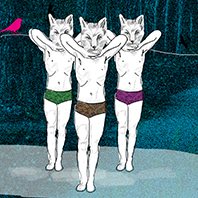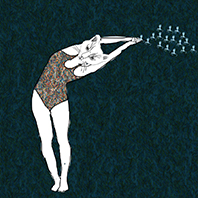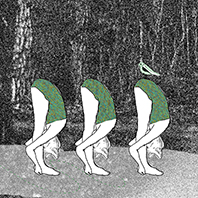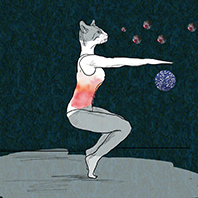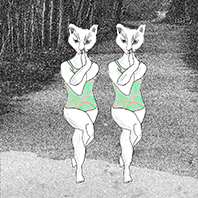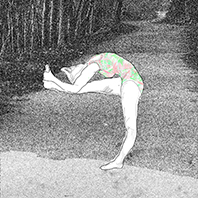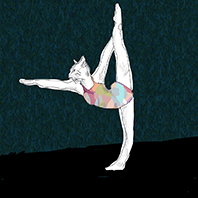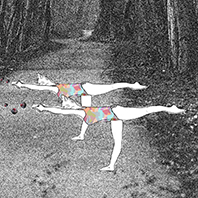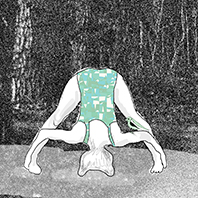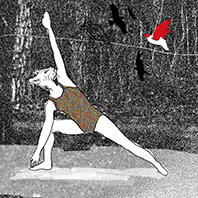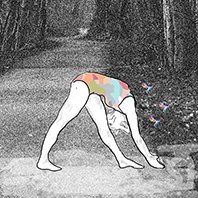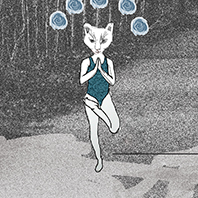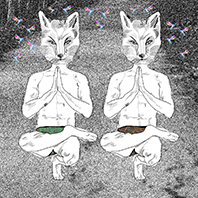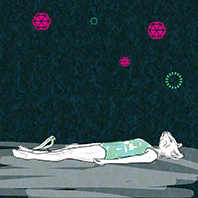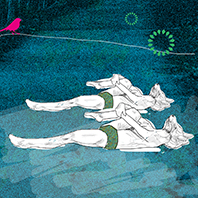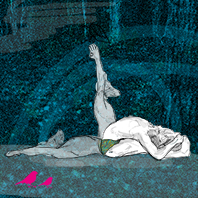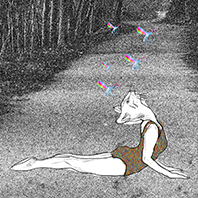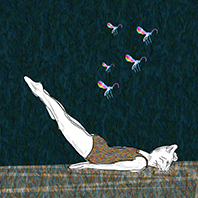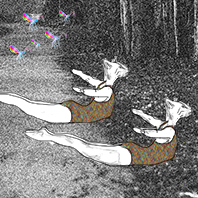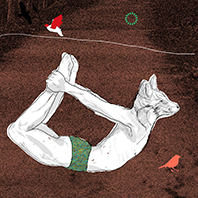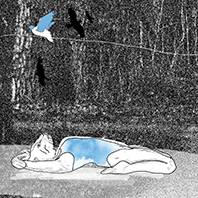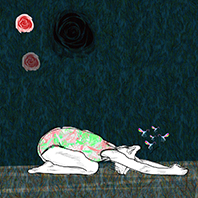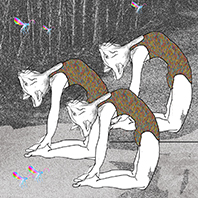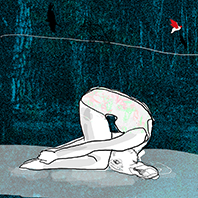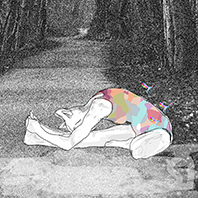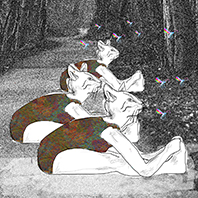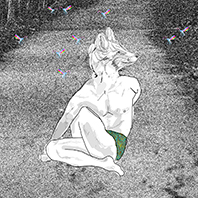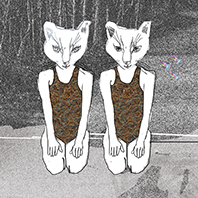Postures
Postures
Bikram’s Beginning Yoga Class is a twenty-six asana series designed to scientifically warm and stretch muscles, ligaments and tendons, in the order in which they should be stretched. Below is a list of the 26 hatha yoga postures with the 2 breathing exercises and their benefits.
1) Pranayama Series
(Standing Deep Breathing Pose)
– helps prevent respiratory problems such as bronchitis, emphysema and shortness of breath.
2) Ardha-Chandrasana and Pada-Hastasana
(Half Moon Pose and Hands to Feet Pose)
– strengthens every muscle in the body’s core and the upper back muscles. It increases the flexibility of the entire spine; promotes proper kidney function; helps to cure enlargement of the liver and spleen. Also firms and trims the waistline, hips, abdomen, buttocks and thighs.
3) Utkatasana
(Awkward Pose)
– will tone and shape your legs. It heals chronically cold feet. It also helps relieve rheumatism and arthritis in the legs, and helps to cure slipped discs and other problems in the lower spine.
4) Garurasana
(Eagle Pose)
– the only posture that opens up the 14 largest joints in the skeletal system. Beyond improving flexibilities in the hips, knees, ankles and the rest, Eagle Pose also supplies fresh blood to the reproductive system and sex organs, plus the kidneys, which increases sexual vitality and helps manage reproductive issues.
5) Dandayamana-Janushirasana
(Standing Head to Knee Pose)
– improves the flexibility of the sciatic nerves and strengthens the hamstrings and leg muscles. It also works the muscles of the back, the biceps and the triceps. It helps to squeeze and flush out the internal abdominal organs, such as the gall bladder, pancreas and spleen, as well as the uterus and ovaries.
6) Dandayamana-Dhanurasana
(Standing Bow Pulling Pose)
– moves all the blood from one side of the body to the other, then back again. It develops balance, increases the size and elasticity of the rib cage, firms the abdominal wall and upper thighs. It improves the flexibility and strength of the lower spine. Standing Bow builds patience, determination and concentration.
7) Tuladandasana
(Balancing Stick Pose)
– the forward tilt of your torso sends high-speed blood pouring into the heart, especially the neglected region, cleaning out the veins and all the arteries, strengthening the heart muscle. The same rejuvenating flood rushes into the brain as well. It strengthens your powers of concentration.
8) Dandayamana-Bibhaktapada-Paschimotthanasana
(Standing Separate Leg Stretching Pose)
– great for sciatica because it stretches and strengthens the sciatic nerves, as well as all the tendons in the legs. It also massages the internal abdominal organs and the small and large intestines, and gives you added flexibility in the pelvis, ankles, hip joints and especially in the last five vertebrae of the spine.
9) Trikanasana
(Triangle Pose)
– improves every single bone, muscle, joint, tendon and internal organ, and it revitalizes nerves, veins and tissues.Flexing and strengthening the last five vertebrae in this posture can alleviate crooked spines, as well as rheumatism and lower back pain. Triangle Pose also benefits the heart and lungs, forcing them to work together.
10) Dandayamana-Bibhaktapada-Janushirasana
(Standing Separate Leg Head to Knee Pose )
– trims the abdomen, waistline, hips, buttocks and thighs. It massages and compresses the thyroid gland, which helps to regulate the metabolism and the immune system.
11) Tadasana
(Tree Pose)
– improves posture and balance and increases the flexibility of the ankles and knees as well as the hip joints. By strengthening the internal oblique muscles, it prevents hernia.
12) Padangustasana
(Toe Stand Pose)
– strengthens the knees and is therapeutic for rheumatism of the knees, ankles, and feet. It also opens up the knee and hip joints, and helps cure hemorrhoid problems. It also develops mental strength.
13) Savasana
(Dead Body Pose)
– facilitates powerful blood flow, then lets circulation return to normal, creating internal cleansing, greatly magnifying the benefits of the postures that precede it. Savasana helps us to learn true relaxation.
14) Pavanamuktasana
(Wind Removing Pose)
– compresses and massages the ascending colon and descending colon. It also messages the transverse colon and compresses the entire digestive system. It strengthens the arms, prevents flatulence, improves hip flexibility, and firms the abdomen and thighs.
15) Sit-up
– stretches the spine and increases flexibility. Firms and trims the lower body. It works the muscles, ligaments and tendons of the legs and improves circulation there as well.
16) Bhujangasana
(Cobra Pose)
– strengthens the lumbar spine, relieving pain and combating herniated discs, scoliosis and arthritis in the lower spine. Other important benefits include improved digestion, relief from menstrual disorders, improved appetite, and raising low blood pressure. Cobra Pose also improves the functioning of the liver and spleen.
17) Salabhasana
(Locust Pose)
– has many of the same benefits as Cobra, but it is even better for slipped discs and sciatica. It strengthens the upper spine, and the uncomfortable stretching of the arms can relieve tennis elbow. Locust can also help with varicose veins in the legs.
18) Poorna-Salabhasana
(Full Locust Pose)
– increases strength in the middle spine; it is good for scoliosis, kyphosis, spondylosis and slipped discs. It opens up the rib cage and increases elasticity there. It also firms the abdominal muscles, upper arms, hips and thighs.
19) Dhanurasana
(Bow Pose)
– opens up the rib cage, which allows the lungs to expand more fully. This 360-degree flexion of the spine revitalizes all the spinal nerves by increasing circulation, and strengthens the spine along its entire length. Besides helping with all manner of back problems, Bow Pose aids digestion, fights constipation, and combats bronchitis and diabetes while improving the functioning of the large and small intestines, the liver, kidneys and spleen.
20) Supta-Vajrasana
(Fixed Firm Pose)
– strengthens and improves the flexibility of the lower spine, hips, knees and ankle joints. It increases circulation to the lower limbs, and is therapeutic for lower back pain, sciatica, rheumatism and varicose veins.It helps prevent hernias.
21) Ardha-Kurmasana
(Half Tortoise Pose)
– great for tense necks and shoulders. It also increases blood flow to the brain, which enhances memory and mental clarity. This posture stretches the lower part of the lungs, which is therapeutic for asthma, and counter indigestion, flatulence, constipation and irritable bowel syndrome.
22) Ustrasana
(Camel Pose)
– creates maximum compression of the spine, which stimulates the nervous system. It also improves flexibility of the neck and spine, relieves backache, and helps degenerative spinal problems such as kypho-scoliotic deformities and cervical spondylosis. By stretching the abdominal organs, Camel helps constipation, and it also stretches the throat and thyroid and parathyroid glands.
23) Sasangasana
(Rabbit Pose)
– creates maximum extension of the spine, increasing its mobility and elasticity. Spine stretching also expedites the feeding of the nervous system with fresh blood and oxygen. It relieves tension in the neck, shoulders and back. It helps alleviate colds, sinus problems, and chronic tonsillitis and, through compression of thyroid and parathyroid, rejuvenates those glands as well. Can also be therapeutic for insomnia, diabetes and depression.
24) Janushirasana with Paschimotthanasana
(Head to Knee Pose with Stretching Pose)
– excellent for the immune and lymphatic systems, increases circulation to the liver, pancreas, thyroid, thymus and intestines. It improves digestion and is good for allergies and arthritis. It also relieves chronic diarrhea by improving the circulation in the bowels.
25) Ardha-Matsyendrasana
(Spine Twisting Pose)
– the only posture that twists the spine from top to bottom, which increases circulation to all the spinal nerves, veins, and tissues, and improves the elasticity of the spine. Spine Twisting relieves lower back pain and helps prevent slipped discs, rheumatism of the spine, kyphosis, scoliosis, cervical spondylosis and arthritis. It also calms the nervous system.
26) Khapalbhati
(Blowing in Firm Pose)
– improves digestion and circulation, and increases the elasticity of the lungs with every forceful exhale. You generate prana, and push out every ounce of carbon dioxide, replacing it with life-giving oxygen. It also strengthens the abdominal organs and increases circulation to them. Blowing in Firm stimulates the digestive system as well.
Health benefits
Bikram Yoga systematically moves fresh, oxygenated blood to one hundred percent of your body, to each organ and fiber, restoring all systems to healthy working order, just as nature intended. Proper weight, muscle tone, vibrant good health, and a sense of well-being will automatically follow.
With regular practice you will enjoy numerous benefits including: improved strength, flexibility and balance, tones muscles, improves immune system, reduces stress, increases lung capacity, increases bone density, aids digestive & circulatory systems, flushes lymphatic system, promotes relaxation and a sense of well-being.
All illustrations copyrighted 2014 © Lisa Wigren.

